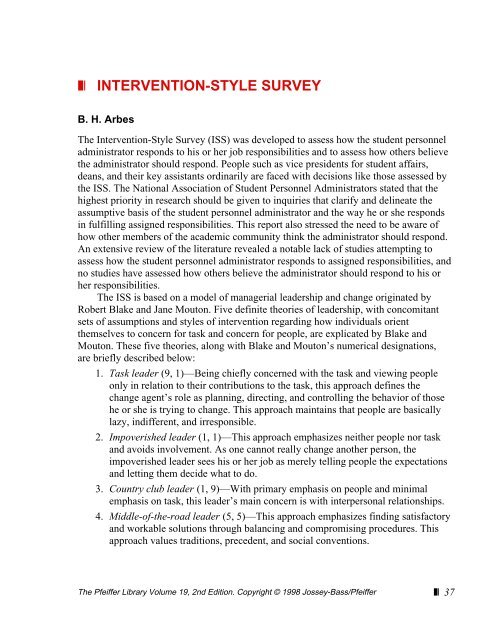motivational analysis of organizations
motivational analysis of organizations
motivational analysis of organizations
Create successful ePaper yourself
Turn your PDF publications into a flip-book with our unique Google optimized e-Paper software.
❚❘ INTERVENTION-STYLE SURVEY<br />
B. H. Arbes<br />
The Intervention-Style Survey (ISS) was developed to assess how the student personnel<br />
administrator responds to his or her job responsibilities and to assess how others believe<br />
the administrator should respond. People such as vice presidents for student affairs,<br />
deans, and their key assistants ordinarily are faced with decisions like those assessed by<br />
the ISS. The National Association <strong>of</strong> Student Personnel Administrators stated that the<br />
highest priority in research should be given to inquiries that clarify and delineate the<br />
assumptive basis <strong>of</strong> the student personnel administrator and the way he or she responds<br />
in fulfilling assigned responsibilities. This report also stressed the need to be aware <strong>of</strong><br />
how other members <strong>of</strong> the academic community think the administrator should respond.<br />
An extensive review <strong>of</strong> the literature revealed a notable lack <strong>of</strong> studies attempting to<br />
assess how the student personnel administrator responds to assigned responsibilities, and<br />
no studies have assessed how others believe the administrator should respond to his or<br />
her responsibilities.<br />
The ISS is based on a model <strong>of</strong> managerial leadership and change originated by<br />
Robert Blake and Jane Mouton. Five definite theories <strong>of</strong> leadership, with concomitant<br />
sets <strong>of</strong> assumptions and styles <strong>of</strong> intervention regarding how individuals orient<br />
themselves to concern for task and concern for people, are explicated by Blake and<br />
Mouton. These five theories, along with Blake and Mouton’s numerical designations,<br />
are briefly described below:<br />
1. Task leader (9, 1)—Being chiefly concerned with the task and viewing people<br />
only in relation to their contributions to the task, this approach defines the<br />
change agent’s role as planning, directing, and controlling the behavior <strong>of</strong> those<br />
he or she is trying to change. This approach maintains that people are basically<br />
lazy, indifferent, and irresponsible.<br />
2. Impoverished leader (1, 1)—This approach emphasizes neither people nor task<br />
and avoids involvement. As one cannot really change another person, the<br />
impoverished leader sees his or her job as merely telling people the expectations<br />
and letting them decide what to do.<br />
3. Country club leader (1, 9)—With primary emphasis on people and minimal<br />
emphasis on task, this leader’s main concern is with interpersonal relationships.<br />
4. Middle-<strong>of</strong>-the-road leader (5, 5)—This approach emphasizes finding satisfactory<br />
and workable solutions through balancing and compromising procedures. This<br />
approach values traditions, precedent, and social conventions.<br />
The Pfeiffer Library Volume 19, 2nd Edition. Copyright © 1998 Jossey-Bass/Pfeiffer ❚❘ 37

















